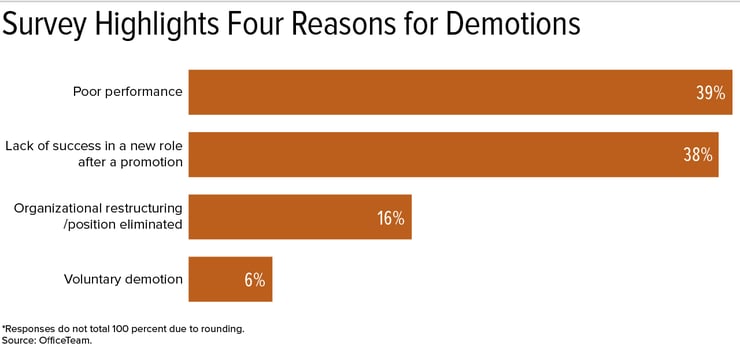It was just another day at the (home)office when your manager asks to have a word with you. Without any suspicion, you join the meeting only to realize this is a conversation about you getting demoted.
What is a Demotion?
A demotion stands for reducing the employee’s level of responsibility, the scope of duties, and oftentimes pay compared to the current role. Essentially, demotion is the opposite of promotion at work.
Demotion also often comes under the disguise of “company restructuring” and “pay cuts”. But the premises stay the same: you get re-assigned to a lower-level position you may not find as appealing as your old role.
Is demotion a common activity? According to a recent survey, about 1 in 10 workers in the US have been asked to assume a lower-level role on average. Among them, 52% choose to quit instead of accepting the demotion offer.
What Normally Happens When Someone is Demoted?
Typically, you will be first invited for a private conversation with your superior and/or HR where the decision will be announced. Then you’ll receive a formal demotion letter and an updated work contract, stating the changes in your employment such as reduction in pay and/or benefits, new title, and main duties.
From there you have two opinions — either accept the new terms or reject them. In the latter case, however, you may likely get fired with little-to-no compensation. Especially if your original contract contained any clauses about the employer’s right to demote you.
Two Types of Demotion
Most demotion decisions come from the above — the management — and can leave you baffled and fazed. But there’s also a possibility that you may be the one asking to “downshift”.
Let’s take a look at both scenarios.
Involuntary Demotion
Involuntary demotion is that dreaded case of being asked to temporarily or permanently shift to a lower-level position. Why do employers do that?
Here are the common reasons for demotions, according to an earlier cited survey:

Source: SHRM
As data tells, most demotions are performance-based. In other words, your management didn’t find you successful in the assigned role either due to:
- Lack of results on the set performance goals
- Overall inefficiency and low output
- Failure to follow company policies
Because of the above factors, they decided to either retract the earlier promotion. Or reduce the scope and complexity of your responsibilities. At good companies, such decisions are rarely taken lightly. So your employer probably had some valid reasoning. Try to listen to their feedback to figure out which skills and competencies you should further hone. Some employers may also pair the decision to demote someone with assigning extra on-the-job training.
Demotions can also be circumstance-driven. That is when a company undergoes major internal transformations — merges with another business, welcomes a new leadership, restructures departments, etc.
Such tectonic changes often affect the personnel. Your role may become redundant and thus, you are asked to transition to a new one — which unfortunately comes with a lower-grade title.
Or the company just tries to save money and issues a round of pay cuts. Such a scenario is less present since you may end up being underemployed — that is doing a job you are over-qualified to do or getting paid less than you should.
In either case, you are probably upset with the demotion news. But we’ll explain how you can cope with this!
Voluntary Demotion
Voluntary demotion means requesting a reduction of responsibilities on your own accord. Why would anyone do that?
Because on-the-job burnout rates are sky-high. Amidst the ongoing market calamities and the great resignation, many people found themselves with a larger-than-life scope of duties (well beyond their original role). In some of such cases, you may even negotiate a demotion without a pay cut. For example, if you’ve been previously covering for a resigned manager (either unofficially or as an interim), you can request to be “demoted” back to your older role on the same terms.
Other reasons for requesting a demotion can be more personal such as an illness or temporary disability. Also, relocation or the decision to continue education are two valid options as well. Changing careers also assumes taking a demotion.
In these cases, however, you are less likely to keep the same compensation. Still, you should try and negotiate the best salary you can!
Is Taking a Demotion Bad?
This is very circumstantial. If you realize that you’d be completely out of work for a long period of time, then accepting an involuntary demotion is better than rage-quitting. However, if your employer clearly low-balled the offer and severely undervalues your expertise, you won’t do yourself any good by accepting a role that sets you back from your career goals.
When it comes to your resume, a demotion won’t be a glaring red flag to most employers. Especially, if you proactively address this fact in your cover letter and explain the circumstances surrounding it.
What Should I Do if I Get Demoted?
If you’ve been called in and given the demotion offer to consider, don’t give an immediate response. Calm your emotions and take some quiet time to process this. Then schedule a follow-up conversation with the management to discuss and negotiate different implications of this decision and follow-up scenarios.
Here’s a step-by-step game plan:
- Ask to discuss the performance-related reasons for demotion. Inquire if your employer sees any ways for you to do better. For example: if they could recommend some on-the-job training, assign a mentor, or provide extra education.
- Review the terms of the deal. Are there any indirect gains from your new position? For example, better work hours, less stress, or an opportunity to work with a new team? A demotion can be a good opportunity to discover a new trajectory for your career path.
- If the offer is meh, update your resume: Grab a free Google Docs resume template, write a new professional summary, list your accomplishments, add a mix of hard and soft skills you’ve developed. Then polish up your LinkedIn profile and start applying for jobs.
Demotion doesn’t signify the end of your career. You are still a capable and talented professional. What you need to do now is find a better role to let those talents blossom. Don’t let your self-doubt sabotage your job search!






